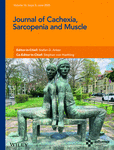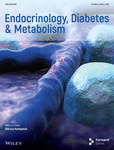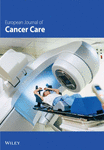Author Guidelines
Overview
JCSM Communications is a peer-reviewed international journal dedicated to publishing materials that are related to cachexia and sarcopenia, as well as to body composition and its physiological and pathophysiological changes during the lifespan and in response to different illnesses from all fields of the life sciences.
The term cachexia describes involuntary weight loss that is observed in the course of many chronic diseases, and is one of the most debilitating and life-threatening aspects of various illnesses at advanced stages. Cachexia, wasting syndromes and sarcopenia are becoming a concerning challenge for an increasing number of patients, their relatives and the medical teams caring for them. JCSM Communications aims to offer a reliable resource to all professionals who are interested in related research or who are involved in the clinical care of affected patients, for example those suffering from AIDS, cancer, chronic heart failure, chronic lung disease, liver cirrhosis, chronic kidney failure, rheumatoid arthritis, or sepsis.
Alterations in body composition, particularly those affecting skeletal muscle, are key elements in the ageing process and in the pathophysiology of several chronic illnesses. Sarcopenia, i.e. loss of functional muscle mass without weight loss, is part of the ageing process and may play a role in reduced physical performance, falls, and disability. Studies on the functional importance of fat tissue and mechanisms leading to lipolysis are equally of interest as are studies on mechanisms of muscle wasting.
The pathophysiology of cachexia involves a complex interaction between disease and body. Consequently, numerous potential therapeutic approaches are being considered and developed. Diagnostic and assessment approaches also involve researchers and clinicians seeking better screening and evaluation options and enhanced biomarkers through validated complementary investigations. This makes JCSM Communications a reliable resource of information for physicians, biochemists, biologists, dieticians, pharmacologists, and students dealing with cachexia, wasting and sarcopenia in various diseases.
Sections
1. Submission and Peer Review Process
Once the submission materials have been prepared in accordance with the Author Guidelines, manuscripts should be submitted online at: https://www.editorialmanager.com/rco2/default.aspx.
For help with submissions, please contact: [email protected].
This journal does not charge submission fees.
Article Preparation Support
Wiley Editing Services offers expert help with English Language Editing, as well as translation, manuscript formatting, figure illustration, figure formatting, and graphical abstract design – so you can submit your manuscript with confidence.
Also, check out our resources for Preparing Your Article for general guidance about writing and preparing your manuscript.
Open Access
This journal is a Gold Open Access journal. Submissions will be subject to an APC if accepted and published in the journal. You can read more about APCs and whether you may be eligible for waivers or discounts, through your institution, funder, or a country waiver. For more information on this journal’s APCs and licensing policy, please visit the journal’s Open Access page here.
Preprint Policy
Please find the Wiley preprint policy here.
This journal accepts articles previously published on preprint servers.
JCSM Communications will consider for review articles previously available as preprints. You are requested to update any pre-publication versions with a link to the final published article. You may also post the final published version of the article immediately after publication.
Data Sharing and Data Availability
For submissions after July 2024 this journal encourages data sharing. Review Wiley’s Data Sharing policy where you will be able to see and select the data availability statement that is right for your submission.
Data Citation
Please review Wiley’s Data Citation policy.
Data Protection
By submitting a manuscript to or reviewing for this publication, your name, email address, and affiliation, and other contact details the publication might require, will be used for the regular operations of the publication. Please review Wiley’s Data Protection Policy to learn more.
Funding
You should list all funding sources in the Acknowledgments section. You are responsible for the accuracy of their funder designation. If in doubt, please check the Open Funder Registry for the correct nomenclature.
Authorship
All listed authors should have contributed to the manuscript substantially and have agreed to the final submitted version. Review editorial standards and scroll down for a description of authorship criteria.
The journal allows for only one corresponding author per manuscript submission. The corresponding author serves as the main contact for the journal office and is the sole author who can access or modify the manuscript during the editorial review process. Once the manuscript is accepted for publication, the authors have the option to appoint up to two additional individuals who can be contacted by readers.
Modifications to the list of authors after submission, such as changes in the order of authors or the addition or removal of authors, require the agreement of all authors concerned.
After a manuscript has been accepted, no modifications to authorship are permitted. This includes adding or removing authors, changing the Corresponding Author, or adjusting the order of authors. Any requests regarding an exception to this guideline must be made directly to the editorial office.
Author Pronouns
Authors may now include their personal pronouns in the author bylines of their published articles and on Wiley Online Library. Authors will never be required to include their pronouns; it will always be optional for the author. Authors can include their pronouns in their manuscript upon submission and can add, edit, or remove their pronouns at any stage upon request. Submitting/corresponding authors should never add, edit, or remove a coauthor’s pronouns without that coauthor’s consent. Where post-publication changes to pronouns are required, these can be made without a correction notice to the paper, following Wiley’s Name Change Policy to protect the author’s privacy. Terms which fall outside of the scope of personal pronouns (e.g. proper or improper nouns), are currently not supported.
ORCID
This journal requires ORCID. Please refer to Wiley’s resources on ORCID.
Reproduction of Copyright Material
If excerpts from copyrighted works owned by third parties are included, all sources must be credited within the manuscript. At minimum, the title and author should be provided.
The corresponding author is responsible for obtaining written permission to reproduce the material "in print and other media" from the publisher of the original source, and for supplying Wiley with that permission upon request
For more information, review Wiley’s Guidelines for Obtaining Permission to Reproduce Material.
Title Page
The title page should contain:
- A brief (up to 20 words) informative title containing the major key words. The title should not contain abbreviations (see Wiley's best practice SEO tips);
- A short running title of less than 40 characters;
- The full names of all the authors;
- The author's institutional affiliations where the work was conducted, with a footnote for the author’s present address if different from where the work was conducted;
- Acknowledgments;
- Statements relating to our ethics and integrity policies, which may include any of the following (Why are these important? We need to uphold rigorous ethical standards for the research we consider for publication):
- data availability statement;
- funding statement;
- conflict of interest disclosure;
- ethics approval statement;
- patient consent statement;
- permission to reproduce material from other sources;
- clinical trial registration.
Manuscripts can be uploaded either as a single document (containing the main text, tables and figures), or with figures and tables provided as separate files. The main manuscript file can be submitted in Microsoft Word (.doc or .docx).
Main Text File
Your main document file should include:
- A short informative title containing the major key words. The title should not contain abbreviations;
- The full names of the authors with institutional affiliations where the work was conducted, with a footnote for the author’s present address if different from where the work was conducted;
- Acknowledgments;
- Structured abstract of 150 to 400 words (Background/Methods/Results/Conclusion); or for Case Reports (Background/Case Presentation/Conclusion)
- Up to seven keywords;
- Main body formatted as introduction, materials and methods, results, discussion, conclusion;
- References;
- Tables (each table complete with title and footnotes);
- Figure legends: At initial submission, figures can be included in the manuscript or can be submitted in separate files. Should your manuscript reach revision stage, figures and tables must be provided as separate files (see below).
Reference Style
This journal uses Vancouver reference style. Review your reference style guidelines prior to submission.
Figures and Supporting Information
Figures, supporting information, and appendices should be supplied as separate files. You should review the basic figure requirements for manuscripts for peer review, as well as the more detailed post-acceptance figure requirements. View Wiley’s FAQs on supporting information.
Journal Requirements for Article Formatting
- Manuscripts should be submitted in Word.
- Use a normal, plain font (e.g., 10-point Times Roman) for text.
- Use italics for emphasis.
- Use the automatic page numbering function to number the pages.
- Do not use field functions.
- Use tab stops or other commands for indents, not the space bar.
- Use the table function, not spreadsheets, to make tables.
Headings
Please use no more than three levels of displayed headings.
Abbreviations
Abbreviations should be defined at first mention and used consistently thereafter.
Footnotes
Footnotes can be used to give additional information, which may include the citation of a reference included in the reference list. They should not consist solely of a reference citation, and they should never include the bibliographic details of a reference. They should also not contain any figures or tables. Footnotes to the text are numbered consecutively; those to tables should be indicated by superscript lower-case letters (or asterisks for significance values and other statistical data). Footnotes to the title or the authors of the article are not given reference symbols.
Acknowledgments
Acknowledgments of people, grants, funds, etc. should be placed in a separate section before the reference list. The names of funding organizations should be written in full.
Peer Review
This journal operates a single-anonymized peer review policy. Except where otherwise stated, manuscripts are peer reviewed by at least two anonymous reviewers and an Associate or Assistant Editor. Papers will only be sent to review if the Editor-in-Chief determines that the paper meets the appropriate quality and relevance requirements.
In-house submissions, i.e. papers authored by Editors or Editorial Board members of the title, will be sent to Editors unaffiliated with the author or institution and monitored carefully to ensure there is no peer review bias.
Wiley's policy on the confidentiality of the review process is available here.
Refer and Transfer Program
Wiley believes that no valuable research should go unshared. This journal participates in Wiley’s Refer & Transfer program. If your manuscript is not accepted, you may receive a recommendation to transfer your manuscript to another suitable Wiley journal, either through a referral from the journal’s editor or through our Transfer Desk Assistant.
Transfer of Papers
Submissions to The Journal of Cachexia, Sarcopenia and Muscle may be transferred (with author approval) to JCSM Communications, if the Editor(s) believes that the paper is suitable. Any peer reviews conducted by The Journal of Cachexia, Sarcopenia and Muscle will also be transferred, upon approval.
Appeals and Complaints
Authors may appeal an editorial decision if they feel that the decision to reject was based on either a significant misunderstanding of a core aspect of the manuscript, a failure to understand how the manuscript advances the literature or concerns regarding the manuscript-handling process. Differences in opinion regarding the novelty or significance of the reported findings are not considered as grounds for appeal. To raise an appeal, please contact this journal by email, quoting your manuscript ID number and explaining your rationale for the appeal. The editor’s decision following an appeal consideration is final.
To raise a complaint regarding editorial staff, policy or process please contact the journal in the first instance. If you believe further support outside the journal’s management is necessary, please refer to Wiley’s Best Practice Guidelines on Research Integrity and Publishing Ethics.
AI Policy
Artificial Intelligence Generated Content (AIGC) tools — such as ChatGPT and others based on large language models (LLMs) — cannot be considered capable of initiating an original piece of research without direction by human authors. They also cannot be accountable for a published work or for research design, which is a generally held requirement of authorship (as discussed in the previous section), nor do they have legal standing or the ability to hold or assign copyright. Therefore — in accordance with COPE’s position statement on AI tools — these tools cannot fulfill the role of, nor be listed as, an author of an article. If an author has used this kind of tool to develop any portion of a manuscript, its use must be described, transparently and in detail, in the Methods or Acknowledgements section. The author is fully responsible for the accuracy of any information provided by the tool and for correctly referencing any supporting work on which that information depends. Tools that are used to improve spelling, grammar, and general editing are not included in the scope of these guidelines. The final decision about whether use of an AIGC tool is appropriate or permissible in the circumstances of a submitted manuscript or a published article lies with the journal’s editor or other party responsible for the publication’s editorial policy.
Guidelines on Publishing and Research Ethics in Journal Articles
This journal requires that you include in the manuscript details IRB approvals, ethical treatment of human and animal research participants, and gathering of informed consent, as appropriate. You will be expected to declare all conflicts of interest, or none, on submission. Please review Wiley’s policies surrounding human studies, animal studies, clinical trial registration, biosecurity, and research reporting guidelines.
This journal follows the core practices of the Committee on Publication Ethics (COPE) and handles cases of research and publication misconduct accordingly (https://publicationethics.org/core-practices).
IThenticate CrossCheck
This journal uses iThenticate’s CrossCheck software to detect instances of overlapping and similar text in submitted manuscripts. Read Wiley’s Top 10 Publishing Ethics Tips for Authors and Wiley’s Publication Ethics Guidelines.
Author Contributions
From July 2024 this journal mandates the CRediT (Contribution Roles Taxonomy) for all articles —more information is available on our Author Services site.
2. Article Types
|
Article Type |
Description |
Word Limit |
Abstract / Structure |
Other Requirements |
|
Original Article |
Reports of new research findings or conceptual analyses that make a significant contribution to knowledge |
5000 |
Yes, Structured |
Data Availability Statement IRB Statement |
|
Case Report |
Communicating something new that has been learnt from clinical practice, including unusual observations and new approaches |
1200 |
Yes, Structured |
Data Availability Statement IRB Statement Patient Consent statement |
|
Rapid/Short Communication |
Preliminary findings of research in progress |
2500 |
Yes, Structured |
Data Availability Statement IRB Statement |
|
Letter to the Editor |
Correspondence allowing readers to participate and debate recently published JCSM Communications articles |
1000-1500 |
No |
N/A |
|
Editorial |
Must email editorial office requesting to submit |
1500-2000 |
|
|
3. After Acceptance
Wiley Author Services
When an accepted article is received by Wiley’s production team, the corresponding author will receive an email asking them to login or register with Wiley Author Services. You will be asked to sign a publication license at this point as well as pay for any applicable APCs.
Copyright & Licensing
JCSM Communications is an Open Access journal: authors of accepted papers pay an Article Publication Charge and their papers are published under a Creative Commons license. Note that certain funders mandate a particular type of CC license be used. For more information on this journal’s APCs and licensing policy, please visit the journal’s Open Access page here.
Early View
Upon publication, articles are available as full text HTML or PDF in Early View prior to inclusion in an issue and can be cited as references using their Digital Object Identifier (DOI) number.
Proofs
Authors will receive an e-mail notification with a link and instructions for accessing HTML page proofs online/with their proofs included as a pdf. Authors should also make sure that any renumbered tables, figures, or references match text citations and that figure legends correspond with text citations and actual figures. Proofs must be returned within 48 hours of receipt of the email.
Article Promotion Support
Wiley Editing Services offers professional video, design, and writing services to create shareable video abstracts, infographics, conference posters, lay summaries, and research news stories for your research – so you can help your research get the attention it deserves.
Author Name Change Policy
In cases where authors wish to change their name following publication, Wiley will update and republish the paper and redeliver the updated metadata to indexing services. Our editorial and production teams will use discretion in recognizing that name changes may be of a sensitive and private nature for various reasons including (but not limited to) alignment with gender identity, or as a result of marriage, divorce, or religious conversion. Accordingly, to protect the author’s privacy, we will not publish a correction notice to the paper, and we will not notify co-authors of the change. Authors should contact the journal’s Editorial Office with their name change request.
Correction to Authorship
In accordance with Wiley’s Best Practice Guidelines on Research Integrity and Publishing Ethics and the Committee on Publication Ethics’ guidance, JCSM Communications will allow authors to correct authorship on a submitted, accepted, or published article if a valid reason exists to do so. All authors – including those to be added or removed – must agree to any proposed change. To request a change to the author list, please complete the Request for Changes to a Journal Article Author List Form and contact either the journal’s editorial or production office, depending on the status of the article. Authorship changes will not be considered without a fully completed Author Change form. [Correcting the authorship is different from changing an author’s name; the relevant policy for that can be found in Wiley’s Best Practice Guidelines under “Author name changes after publication.”]






